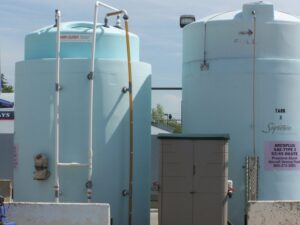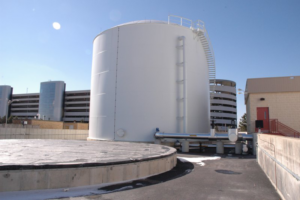 What kinds of containers are regulated at BWI Marshall and Martin State Airports?
What kinds of containers are regulated at BWI Marshall and Martin State Airports?
Containers such as aboveground storage tanks (ASTs) and 55-gallon drums can trigger environmental regulations if the amount stored by a tenant triggers certain limits (see “What do these regulations require?” for additional information).
Additionally, environmental regulations (40 CFR 110) define “harmful quantities” as any discharge that violates an applicable water quality standard, or would cause a “film or sheen upon or discoloration of the surface of the water”. Spills from any container, regardless of size, could trigger these regulations.
Federal and Maryland regulations have specific requirements to prevent spills from ASTs and other aboveground containers or equipment that contain oil (“oil” includes all petroleum products such as gasoline or diesel fuel). In addition to fuel for aircraft and vehicles, tanks include those used for heating oil, used oil from vehicle maintenance, and fuel for emergency generators.
Tenants at both BWI Marshall and Martin State Airports own ASTs containing fuel that are subject to environmental regulations and requirements through:
- The National Fire Protection Association
- The Code of Maryland Regulations
- The Code of Federal Regulations (Clean Water Act, Oil Pollution Act)
- MDOT MAA Tenant Directives
Regulations dealing with oil in general include the Clean Water Act CWA, Section 311(b), which prohibits discharges of oil in quantities that may be harmful to the public health or the environment. Additionally, federal regulations (40 CFR 110) define a harmful quantity of spilled oil to be one that causes a “film or sheen upon or discoloration of the surface of the water.” The Oil Pollution Act (OPA 90) amended the CWA to expand the authority of the federal government to direct and manage oil spill cleanups, and substantially increased the civil and criminal penalties for violating marine safety and water pollution laws.
Regulations were passed and modified under the CWA and OPA 90 that require preparation of oil Spill Prevention Control and Countermeasure (SPCC) plans. These regulations (40 CFR 112 et seq.) identify the technical and administrative requirements that must be implemented at any regulated facility to ensure that any potential discharge of oil (i.e., spill) will not reach navigable waters.
In addition to the Federal SPCC program, Maryland has laws (MECA Environment Article, §4) and regulations (COMAR 26.10.01.12) governing the minimum requirements necessary for preventing oil spills from ASTs. Maryland has adopted, by reference, standards for aboveground storage tanks from the National Fire Protection Association (NFPA; 30, 31, 30A) and the American Petroleum Institute (API).
Aboveground tanks that contain oil also need to meet a number of specific requirements relating to their construction, operation, and inspection. These requirements are referenced in the Maryland State Code (COMAR 26.10.01.12).
Glycol is also stored in ASTs at BWI Marshall Airport. Glycol storage is also addressed through the NFPA, the Maryland Code of Regulations and BWI Marshall Tenant Directives. See Tenant Directive 215.2 (Glycol Aboveground Storage Tank Standards for Design, Location, and Operation) for more information.
The federal regulations (40 CFR 112 et seq.) require the development of a SPCC plan by facilities that exceed either 42,000 gallons of underground aggregate oil storage or 1,320 gallons of aboveground aggregate oil storage. For aboveground storage, only those containers with a capacity of 55 gallons or more are counted for SPCC purposes. These requirements apply to both petroleum-based and non-petroleum oils. The regulations apply specifically to a facility’s storage capacity, regardless of whether the tank(s) is completely filled. The purpose of the plans is to ensure that the likelihood of oil spills is minimized and will not reach navigable waters.
The regulation requires that all regulated facilities have a fully prepared and implemented SPCC Plan, which includes carrying out the measures the facility identified for containing a spill (e.g., berms). Or, if containment measures cannot be implemented, the tenant must:
- Demonstrate that secondary containment is impracticable
- Conduct periodic integrity and leak testing of bulk containers and associated valves and piping
- Develop and incorporate a strong spill contingency plan into the SPCC Plan
- Provide a written commitment of manpower, equipment, and materials required to quickly remove any quantity of oil discharged that may be harmful
In addition, facility owners or operators must conduct employee training on the contents of the SPCC Plan. A facility that was in operation on or before August 16, 2002 must make any necessary amendments to its SPCC Plan, and implement that Plan, on or before October 31, 2007. Under the new §112.3(b), a facility that came into operation after August 16, 2002 must also prepare and implement an SPCC Plan on or before October 31, 2007.
All regulated ASTs are required to have secondary containment, such as dikes. Other requirements for regulated ASTs can be found in COMAR 26.10.01.12.
In addition to these requirements, ASTs with capacities of 1,000 gallons of used oil or 10,000 gallons or more of virgin oil are required to have oil operations permits in place. The Maryland Department of Environment’s Oil Control Program issues these permits.
For underground storage, all underground storage tanks (USTs) that are subject to all the technical requirements of 40 CFR Part 280 or a State program that is approved under 40 CFR Part 281 are exempted from both the aggregate storage calculation and the technical requirements of the SPCC regulations.
There are several Tenant Directives that are applicable to those with aboveground storage of fuel/oil or glycol, including:
Tenant Directive 502.3 (Drum/Container Markings, Storage, and Disposal) identifies requirements associated with the proper storage, handling, and disposal of hazardous materials. This includes properly marking drums and containers and providing adequate documentation to inspectors.
Tenant Directive 502.5 (Identification of the Fire Hazards of Stored Materials) identifies the requirements to ensure all storage tanks are identified with the contents being stored and their associated hazards.
Tenant Directive 502.4 (Aboveground/Underground Storage Tank Registration at Baltimore/Washington International Airport) identifies requirements for tenants to submit storage tank information to the MAA.
Tenant Directive 215.2 (Glycol Above-ground Storage Tanks Standards for Design, Location, and Operation) provides standards for design, location, and operation of ASTs containing glycol.
The MDE requires that all applicants fill out an oil operations permit application general form. If you are storing certain quantities of oil in aboveground storage tanks, providing on-shore oil transfer services, and/or transporting oil between sites within the State of Maryland, you are also required to fill out Forms A and MDE 92.
Employees who work with or near oil storage tanks can help minimize the environmental harm from oil spills. There are a number of things that should be incorporated into your daily activities. As federal regulations require, the practices and controls that you use to prevent oil spills must be documented in your SPCC Plan. Measures include:
- Making sure that tanks and drums are designed or stored in a way that will contain any leaks. This is usually done by constructing tanks with an outer shell that can contain any leakage from the inner tank or by constructing a containment dike around the tanks. Drums can be stored on pallets that are designed to catch any leakage.
- Making sure that ASTs are designed and built to industry standards.
- Providing security lighting and fencing to prevent tampering or vandalism of tanks that could cause an oil spill.
- Providing warning systems and procedures to prevent tanks from being overfilled.
- Conducting regular inspection and testing of ASTs.
- Training personnel who fill or empty ASTs in the proper procedures to prevent spills.
- Developing plans and procedures for cleaning up any spills.
- Using oil/water separators to prevent oil and grease from reaching streams or the ground.
- Being familiar with the ASTs, drums, and equipment that your organization is responsible for, and ensuring that they are maintained in good condition and inspected regularly.
- Following proper procedures when filling or emptying tanks.
- Reporting any tanks, drums, or equipment that appear to be damaged, corroded, or otherwise in poor condition.
- Being alert for leaks from tanks, drums, or equipment.
- Following appropriate spill response procedures.
- Having employees become familiar with and trained on your SPCC Plan.
- Ensuring that appropriate personnel receive training about how to prevent and respond to oil spills.
If a spill occurs, tenants must report it to the Airport Operations Center (at BWI Marshall Airport) or Airport Manager (at Martin State Airport) immediately (regardless of the size of the spill). See the Emergency Environmental Response page for more detailed information.
Airport tenants are responsible for all containment, decontamination, and disposal activities for oil/fuel and hazardous material spills. Additional information on spills can be found in Tenant Directive 502.1 (Airport Fuel/Oil and Hazardous Material Spill Procedures and Legal Reporting Responsibilities), which establishes procedures associated with:
- Fuel/oil and hazardous material response and reporting responsibilities
- Containment and decontamination activities
- Collection and disposal of contaminated materials
- Reimbursement of the MAA for support services
Should a permitted AST leak occur, the tenant must also notify the MDE Oil Control Program at 866-633-4686 (24 hours a day) and submit a spill response form.
One of the requirements of tenant leases is that tenants must adhere to the requirements of the applicable tenant directives and associated regulations. Not adhering to these requirements can impact the standing of the tenant lease.
Additionally, fines and criminal penalties assessed by the State of Maryland for damage to water from a leaking AST are found in Maryland Annotated Code (MECA), Environment, Water Management (Title 4), Water Pollution and Abatement (Subtitle 4). Criminal penalties for oil or hazardous substance releases to ground or surface water may range up to $50,000 per day or imprisonment of up to two years. Civil penalties range up to $100,000 in total fines (MECA, Title 4, 4-417).
Federal penalties can also apply. Under OPA 90, negligently discharging oil carries a fine of $2,500 to $25,000 per day of violation, up to one year in prison, or both for a first offense. The penalty is doubled for prior convictions. Knowingly discharging oil carries a fine of $5,500 to $50,000 per day of violation, up to three years in prison, or both for a first offense. The penalty is doubled for prior convictions. Knowingly discharging oil with the knowledge that another person is placed in imminent danger of serious bodily harm or death carries a maximum criminal fine of $250,000 and up to 15 years in prison for the individual, and up to $1,000,000 fine for the organization. Failure to comply with the contingency planning (SPCC) requirements of the Clean Water Act caries a civil penalty of up to $25,000 per day of violation.
More information on this topic can be found at:
- MDE Oil Control Website
- MDE Permit Applications
- MDE Oil Pollution and Tank Management
- EPA Oil Spill
- 40 CFR 110 et seq. – Discharge of Oil
- 40 CFR 112 et seq. – Oil Pollution Prevention
- COMAR 26.10.01 et seq. – Oil Pollution and Tank Management, Oil Pollution
- 33 U.S.C. 1321: 33 U.S.C.A. 2701
- EPA – Spill Prevention Control and Countermeasures (SPCC) Regulation Brochure
- National Fire Protection Association (NFPA)
- American Petroleum Institute (API)


